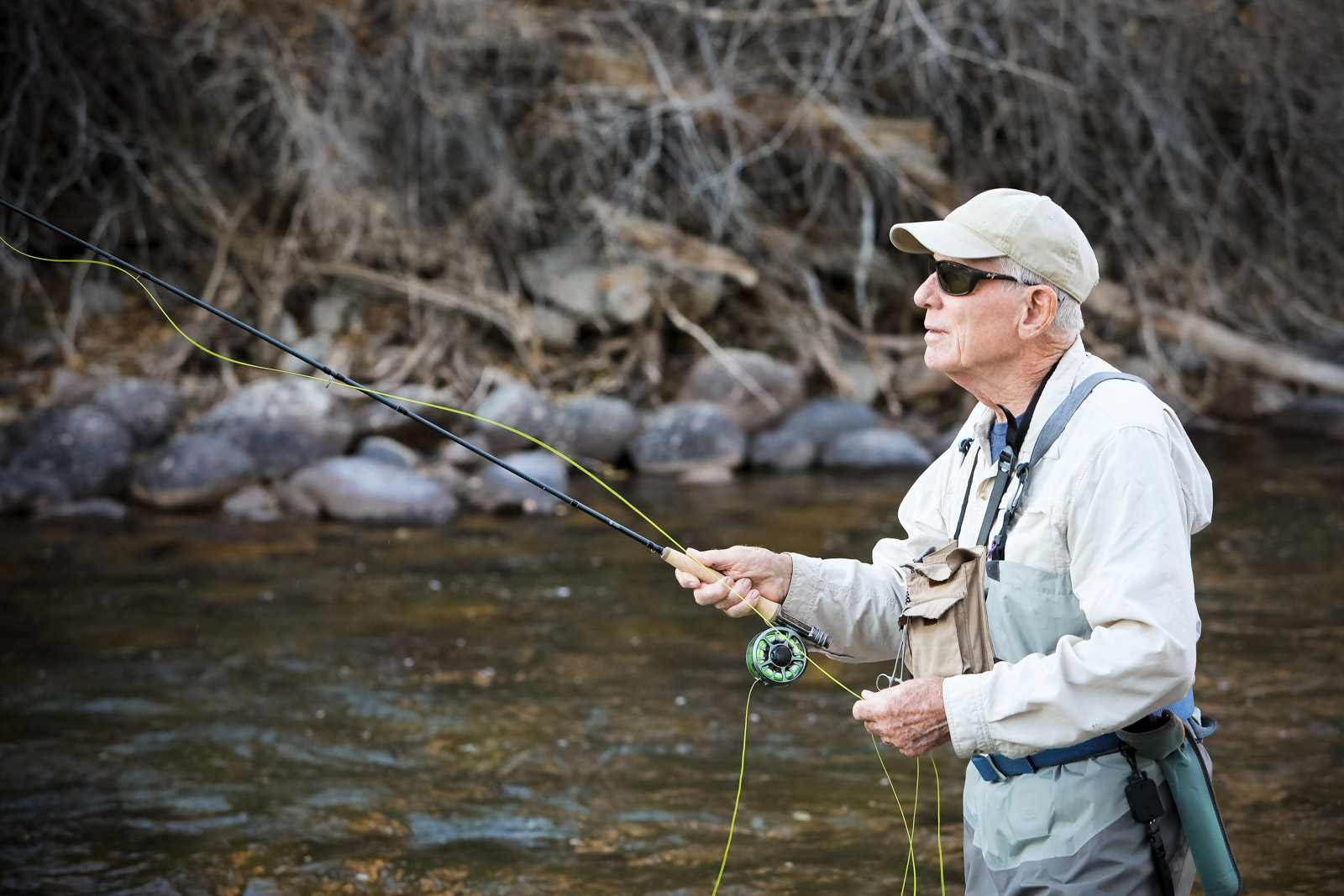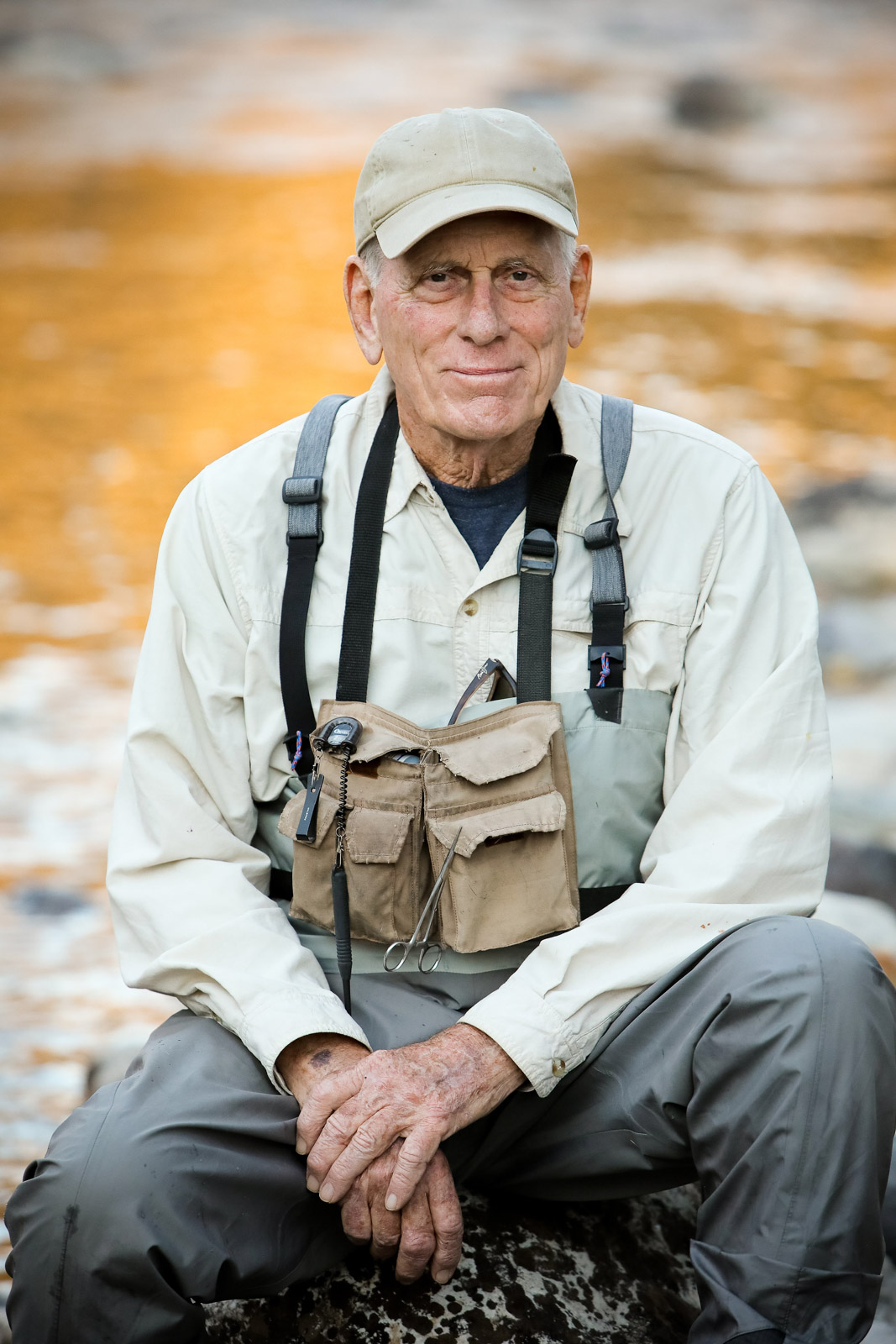Charting the Waters

by Katie Thomas
Renowned Montana writer Thomas McGuane once wrote, “If the trout are lost, smash the state.” He’s been fishing for almost 80 years, just about as long as he’s been writing, and the two activities define him equally. But whether he’s an angler or writer first doesn’t matter—McGuane gives his readers everything in the way of history, stories, advocacy, and pure love for what he refers to as the calling (not the sport) of fly fishing. He’s a recipient of the Heritage Award from the American Museum of Fly Fishing and has been inducted into the Fly Fishing Hall of Fame. Simply put, and in the words of the late Jim Harrison, “Thomas McGuane writes better about fishing than anyone else in the history of mankind.”
Plenty of profiles have focused on McGuane’s peerless prose, not to mention his wild and diverse life—Key West fishing guide, Hollywood screenwriter, literary novelist, cattle rancher, master horseman, brother-in-law to Jimmy Buffet, bearer of the erstwhile nickname “Captain Berserko”—but when we sat down with this Montana legend and modern-day Izaak Walton, we decided to talk about what’s really important: fishing.
MFFM: How has fly fishing shaped your life?
TM: Profoundly, because from the age of six I’ve been a fisherman, and I’ve been a fly fisherman since I was 14. I’ve really let it lead me around by the nose all my life. In fact, some people say I became a writer as a front for fly fishing. I think I love literature enough for that not to be true, but when I travel to a new city, the first thing I do is hit the fly shops and bookstores with equal energy. And that’s really never changed.
Why are you drawn to fly fishing?
My father and grandfather were fly fishermen, and I guess it just seemed like a more poetic way to fish, in which you were more embedded in nature than some other ways. And it’s an interesting type of fishing, because casting is interesting—it’s something you can improve on all your life. And it’s relatively humane compared to bait fishing or plug fishing. I don’t have any problem with anyone preferring to fish that way; I just don’t think it’s as interesting.
Where do you like to fly fish?
I’m kind of an omnivore. I like to fish all over Montana, and I like to fish in the ocean—I like shallow-water ocean fishing, or flats fishing, for snook, redfish, and tarpon. Currently my favorite kinds of fishing are steelhead and Atlantic salmon, when I can. But I have to be invited to do that. I also fish on my own as much as I can. But I’m getting pretty old—some of those big rivers that I used to fish by myself, at crazy hours and in crazy weather, I’m probably not as bold as I used to be. When you’re 84, that’s not the same as 54. But I fish pretty much all the time, whether in Florida or in Montana.
What are some of the most unusual places you’ve gone to fly fish?
I’ve been to Russia three times, and to Iceland three times. I’ve been to the Bahamas a lot, and Belize a couple times. In July I got invited to fish a river in Norway. It’s 300 miles north of the Arctic circle. Because the Gulf Stream goes around that part of Norway, it’s actually balmy at that point; the river we’re fishing is pretty warm and shallow. It’s in the deepest canyon in Europe.

What’s your ideal weekend fishing trip?
Well, I have lots of them. One would be to walk out my door and fish one of the branches of the Boulder River by myself, in July. That’s pretty perfect from my point of view. If I were down in Florida, it would be tarpon fishing in May.
How have things changed in Montana’s outdoor culture since you’ve lived here?
The only outdoor culture I know much about is fishing, and it’s become more crowded. There are greater challenges to the health of fisheries that no one seems to understand. The decline of brown trout in the Big Hole is very concerning. The main thing is that there are really too many fishermen, especially on the Madison. It puts extraordinary pressure on the fish. So I think they’re going to have to figure out a way to control that. In terms of how it’s changed in the over half-century that I’ve been fishing in Montana, it’s become necessary to find some out-of-the-way fishing, maybe less good fishing, to have the quality of peace and solitude that a lot of fly fishermen seek.
Another change is that there are ways of fishing now that are so efficient. Particularly what I call “bobber-management,” which is kind of the universal approach for fishing on the big rivers. That enables guides to take inexperienced anglers out and have them catch lots and lots of fish. One thing I’ve noticed is that our expectations used to be lower. We were almost all wade fishermen; using nymphs from a driftboat is a very effective way to catch a lot of fish. Even with catch-and-release fishing, there’s mortality. So it’s not a good thing to want to have or to have a bonanza day fishing. You can be self-limiting. You should catch and release and know when enough is enough and not try to have a 40-fish day or whatever. If you do, some of those fish are going to die. And that, I think, is some of what’s behind the diminished numbers of fish in the upper Yellowstone and the Big Hole.
Also, access issues have become tenser, in some ways. This is a byproduct of population increase. When I first lived in Montana, you could go anywhere you wanted. There wasn’t a lot of this private-property mania, and most people were happy to let you fish or hunt on their land. We now have so many second homes or out-of-state landowners who are concerned with their property being used or abused in their absence, and they’ve become more militant about boundaries and property use and access to resources, partly because they’re not there. And they’re worried about what’s happening. So that’s tightened things up a bit. But the good thing about having so many hunters and fishermen in the landscape is that they’re real stakeholders in that land, so I think they want the best for the place. They’ll fight for that.
Do you feel you’ve had any influence on the direction of any of these changes?
Well, originally, I was a real avid proponent in my writing and other work for catch-and-release fishing, which was not normal in the late ’60s. Most trout fishermen had a stringer. I’m not really a political writer, but I’ve always cherished my love of Montana wildlife, wildlands, my anxiety about subdivisions, in a pretty visible way in my work. We have a conservation easement on our place, and I’ve spoken out a lot about that in the past. So I guess that’s been my influence on things.
Well, originally, I was a real avid proponent in my writing and other work for catch-and-release fishing, which was not normal in the late ’60s. Most trout fishermen had a stringer. I’m not really a political writer, but I’ve always cherished my love of Montana wildlife, wildlands, my anxiety about subdivisions, in a pretty visible way in my work. We have a conservation easement on our place, and I’ve spoken out a lot about that in the past. So I guess that’s been my influence on things.
Do these changes affect how and where you recreate?
Absolutely. I pick unusual times to fish; this year we’ll go home early [from wintering in Florida] because I want to fish in April. There won’t be anybody around, the weather will be entirely miserable, but fishing’s good. I also fish in some thermally-challenged prairie streams. They’re not blue-ribbon fisheries, maybe second-class fisheries… but often in beautiful land, and fishing is good enough.
What’s your favorite fly of all time?
The Adams. It’s a fly that basically looks like everything, and I can use it without getting incessantly scientific. Also, the rivers I grew up on in Michigan are where the Adams was discovered, for fish. It’s become really the universal trout fly. I went to England one year and used the Adams the whole time, and it just whacked ’em. It’s a tremendous fly; it doesn’t look like anything in particular, it just looks like a bug. So in that sense, it looks like all bugs. It’s just a great fly, and probably everyone feels that way about it.

Talk a bit more about public-access issues.
There’s a movement afoot to restrict public access. I’m a big fan of the Montana Stream Access law, and that’s always under attack. There’s so much checkerboard land held inside of large land holdings, very often by people who don’t live in Montana, that I believe in corner-crossing—it’s very controversial now. It’s already won its case in Wyoming, and the United Property Owners of Montana is fighting it bitterly. The problem is that there’s a legitimate desire to know who’s on your land, but very often we have large ranches held by out-of-state entities and they have hundreds of thousands of acres with public lands locked up inside them.
What sort of work are you involved in to help protect water, public access, trout?
Not much of anything, publicly. I support a number of organizations that are doing that, but in terms of going out there and campaigning, I don’t do that. I like to think my life and my writing show good practices… I guess I walk the walk.
Not much of anything, publicly. I support a number of organizations that are doing that, but in terms of going out there and campaigning, I don’t do that. I like to think my life and my writing show good practices… I guess I walk the walk.
If you had to choose, would you say Montana fly fishing is your favorite, or somewhere else?
Well, I think for day-to-day fishing, Montana probably is the best. Montana is incredibly friendly to trout. Any little piece of running water is going to have trout in it, and that’s not true with any other place. And Montana is a snow-driven ecosystem, so the runoff streams from previous winter snowmelts all end up reaching trout habitat. Montana is probably very hard to beat for someone who just wants to wander around in his own vehicle and go fishing. There are very few places in the world where that’s true. It’s so privatized in most places. We have the advantage of the Stream Access law, which is very unusual. It’s totally different in Wyoming, for example. When we float rivers there, we can’t even anchor, because the adjoining landowners own the bottom. You can’t get out of the boat, you can’t wade, you can’t do anything. It’s very different. Montana fishing is inherently democratic, and I hope it stays that way.

